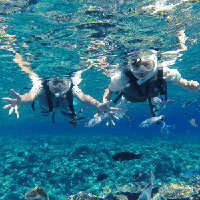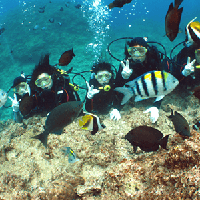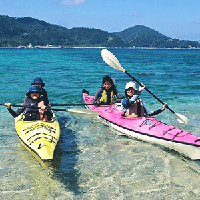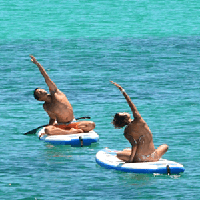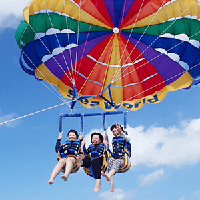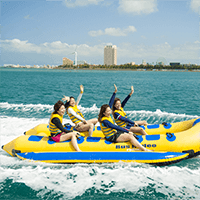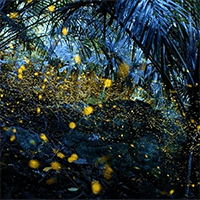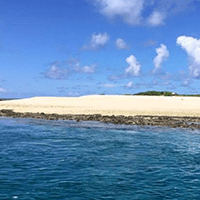List of Yoshino River
- Age 3~Age 100
- 1~2 hours
- 07:00 / 16:00
Meet at Chofu Station or Fukadai Fureai no Sato and go around 6 spots in the Nogawa River on an electric bicycle (with front and rear child seats, children's bicycles are available in various sizes). The tour lasts 2 hours. In the first half, you will fish for carp and catfish with bread. Even children can easily catch them, but the average size is about 60 cm, so you may not be able to catch them. The pull is strong, so please do your best to catch them. In the second half, if the fishing conditions are not good, you will experience searching the river in waders (free fool boots) or marine shoes. The creatures that can be caught are mainly Japanese mitten crabs, Moroko, Minnows, Japanese chibu, Yoshinobori, loach, Ukigori, black killifish, crayfish, and turtles. You can also take them home. What to bring: Marine shoes (from the end of March to October), swimsuit, spats, rash guard, change of clothes, hat, drink, sneakers, plastic case for taking things home + bubble tea (can be sold on-site) What to bring: Rubber boots (from November to mid-March), fishing equipment, bait, rubber boots, net, storage bucket, explanation panel for animals We look forward to your participation. Nogawa Nature School Sonoda (Tosshi)
参加人数が1人だったのでマンツーマンでの体験になりました。釣り初心者ですが、丁寧なサポートをしていただいたので、大きな鯉を釣ることが出来ました!釣りのコツなども教えてもらい、またやりたいと思いました!後半はガサガサ体験をして、たくさんの種類のハゼ、ヤゴ、ザリガニ、エビ、貝などを発見することができ、テンションMAXでした!!また利用したいです!!
- Age 3~Age 18
- Over 6 hours on the day
- 07:00
This is a tour for children only. Children who can travel by train will meet at the east exit of Chofu Station, and those who are being picked up by car will meet at Fukadaiminawa no Sato. This is a Kids Summer Home work DAY at Nogawa Nature School that includes two meals from 7am to around 5pm. Summer vacation independent research plan. One-day child care plan. Only held on weekdays with high tides. From mid-July to the end of August 7:00am Chofu Station East Exit Ground (for children who can ride the train) Fukadai Nigiwai no Sato (for children who are picked up and dropped off by car) ~Experience process~ 7:00am to 9:00am Move to the sea 9:00am to 12:00pm Experience rummaging in the sea (there is also an explanation session on living creatures) Observe 10 types of sea slugs, 10 types of crabs, 10 types of fish, 3 types of starfish, sea urchins, 3 types of sea cucumbers, and octopuses, and observe and explain various living creatures 12:00pm to 1:00pm GUSTO 1:00pm to 3:00pm Search for living creatures in the rivers of Yokosuka city Search for mantis shrimp, mitten crabs, river crabs, monk goby, Yoshinobori, Ukigori, Jyuzukaze goby, and Hebukuro dragonfly larvae. (There is also an explanation session on living creatures) In the rivers of Miura city, we will capture and observe eels in the rivers where they live. 4pm to 6pm Travel to McDonald's & information session on raising animals, feeding habits, and independent research (disbanded after 6pm) Chofu Station or Fukadaimizuno Sato What to bring: marine shoes, change of clothes, swimsuit, drinks (lots), hat, backpack, insect repellent Nogawa Nature School We look forward to your participation.
- Age 0~Age 60
- 2~3 hours
- 09:00 / 13:00
Grilled sweet potato set, rental of foolish boots, river scavenging experience tour, with hot spring (adults only) A warm outdoor nature experience tour held in winter! Making sweet potatoes + river scavenging + hot spring tour (adults only, children are charged, 1 hour ticket) First, make sweet potatoes in a special pot, grill Beni Haruka on low heat for 3 hours, then combine with foolish boots and go on a river scavenging tour. Targets for capture are fish: Oikawa, Motsugo, Moroko, Chichibu, Yoshinobori, Ukigori, 3 types of loach, black killifish, carp crab: Mitten crab After the crayfish schedule, there is an explanation session on living creatures, and there are also effects of global warming and invasive species. Once it is over, move to Yumori no Sato and relax in the hot spring. There is also a restaurant on site and a free shuttle bus, so you can get to Chofu and Musashisakai for free. What to bring: Marine shoes (from the end of March to October), swimsuit, rash guard, spats, drinks, hat, backpack, plastic case for taking things home + Bukubuku (battery-powered oxygen supply device) What to prepare on your side: Electric bicycle, helmet, rubber boots (from November to mid-March), net, storage bucket The meeting place is the free parking lot at Fukadai Nigiwai no Sato, a 50-car coin parking lot, with changing rooms, toilets, and vending machines. We look forward to your participation.
- Age 3~Age 12
- Over 6 hours on the day
- 08:00
This is a tour to go to the river where Oyanirami live and catch them with a net. Other fish that live here include Yoshinobori, crayfish, and dragonfly larvae. After that, we plan to go fishing in the Tama River. The target is a lure called Traget for carnivorous fish such as Small Mouse Bass, catfish, and Nigoi. For young children, they will mainly use bait fishing and reel them in when they catch something. ~Tour flow~ Meet at Chofu Station or Fukadai Nigiwai no Sato at 8:00 (for those who are picking up and dropping off by car). We will explain the characteristics of Oyanirami, how to raise them, and about the near-threatened species, and we will learn that they are carnivorous fish. Oyanirami are freshwater fish belonging to the family Ctenidae of the order Perciformes, and are carnivorous, eating crustaceans, aquatic insects, and small fish. They react quickly to anything that moves and swallow them whole with their large mouths. There are many unusual names for fish, but the standard Japanese name "Oyanirami" is said to have been given because of the way the male protects the eggs, "the parent glares", but there are various theories about the origin of the Japanese name. Travel by train, arrive at the site at 9:00 (planned Tama River tributary @ Kanagawa Prefecture) Fishing experience until 11:00 Lunch at a nearby restaurant from 12:00 to 13:00 (host pays) Small Mouse Bass, catfish, and Nigoi Target lure fishing at Point 2 from 14:00 to 16:00 Around 17:00 We plan to return to Chofu by train. We look forward to your participation. What to bring: Marine shoes (from the end of March to October), swimsuit, rash guard, spats, drinks, hat, rucksack, plastic case for takeaway + Bukubuku (battery-powered oxygen supply machine) What to prepare on your side: Travel by car, 1 set of fishing equipment, foolish boots (from November to mid-March), net, storage bucket
- Age 3~Age 100
- Over 6 hours on the day
- 09:00
This is a tour exclusively for children. Meet at the Wadanagahama Beach parking lot (for those who are picked up by car) Experience scavenging on the rocks of the sea for 1.5 to 2 hours. Catch and observe crabs, sea slugs, sea hares, shellfish, fish, and seaweed (hijiki). Experience scavenging in the river for 1.5 to 2 hours. Catch and observe monk goby, juzukaze goby, ukigori, yoshinobori, chichibu, mantis shrimp, swamp crab, snake black dragonfly larvae, and mitten crab. The schedule may change depending on the tide. Morning Scavenging in the sea until around 13:00 Lunch (assuming a nearby family restaurant) Move from 13:00, river scavenging tour Scheduled to end around 15:00 (scheduled to leave Zushi Station ticket gate) What to bring: From spring to autumn, marine shoes, spats, rash guards, swimsuit, drinks, hat, change of clothes, plastic case for taking home, and for creatures, especially fish, you will need a bubbler. Deep-fried prawns are delicious. (Battery-powered oxygen supply machine) Preparations on our side: net, storage bucket, gloves, car for transportation, cost of lunch restaurant, return transportation, that's it. We look forward to your participation.
- Age 3~Age 12
- 4~5 hours /Over 6 hours on the day
- 09:00
Summer vacation special part 4, Kanagawa edition, is a one-day tour that will include rocky shore scavenging and river scavenging. It will last about 6 hours, and we plan to observe more than 50 types of creatures. Basically, this tour will be held only during spring tide at Wadanagahama from July 20th to August 31st during the summer vacation. Before and after the sea, we will aim for mantis shrimp, mountain crabs, Japanese mitten crabs, stag beetle goby, Yoshinobori, and snake dragonflies in nearby rivers. Sea: sea slugs, crabs, starfish, sea cucumbers, shellfish, fish (gobies), nabeka, blenny, sea urchins (observation only), abalone (observation only), octopus (observation only), etc. River: mantis shrimp, mountain crabs, Japanese mitten crabs, Japanese chibu, minnows, motsuga, shrimp, etc. The meeting and disbanding place is Misakiguchi Station, 5 hours before low tide, and the end time is scheduled to be 4 hours in total. Once the tour is over, we will move to Zushi Station or Misakiguchi Station by car. Due to the spring tide, the tour is only available on certain dates. What to bring: Marine shoes (from the end of March to October), swimsuit, rash guard, spats, drinks, hat, rucksack, plastic case for taking the tour home + bubble tea (battery-powered oxygen supply device) What to prepare on your side: Car transportation, rubber boots (from November to mid-March), net, storage bucket We look forward to your participation.
最近チェックしたプラン
Please wait a moment
![[Tokyo/Chofu] Fishing with Nogawa bread ears from 7:00 AM, 16:00 PM. 80cm class, second half, you can experience the rustling of the river (free rental of Baka boots electric bicycle)の画像](https://img.activityjapan.com/10/47214/10000004721401_atFOJjl6_3.png?version=1707260042)
![[Tokyo, Chofu] Year-round event: Learn about sea and river creatures for one day, Yokosuka Miura, river to sea observationの画像](https://img.activityjapan.com/10/55289/10000005528901_1IgGyMt8_3.png?version=1720412538)
![[Tokyo/Chofu] 9:00 AM, 13:00 PM - *Family friendly* Winter nature experience, roasted sweet potato making experience + adult* Hot spring included! Children *River rustling tourの画像](https://img.activityjapan.com/10/51029/10000005102901_atFOJjl6_3.jpg?version=1713911643)
![[Tokyo/Chofu] Kids Special Adventure Tour to catch Korean fish Oyanirami by fishing with lures @ Tama River (free rental of stupid boots)の画像](https://img.activityjapan.com/10/47131/10000004713101_atFOJjl6_3.png?version=1709014142)
![[Kanagawa/Yokosuka] Kids Adventure Tour *Family Friendly* River Roughing Tour and Wadanagahama Beach, Rock Roughing Experience (Children only)の画像](https://img.activityjapan.com/10/47359/10000004735901_atFOJjl6_3.png?version=1708934481)
![[Kanagawa Prefecture, Yokosuka City] Summer Special Part 4 @Kanagawa Edition 4 hours of exploring the sea and rivers, observing 50 types of creatures ♪ Children onlyの画像](https://img.activityjapan.com/10/47173/10000004717301_atFOJjl6_3.png?version=1678327563)
